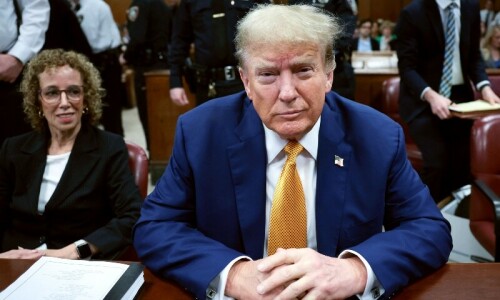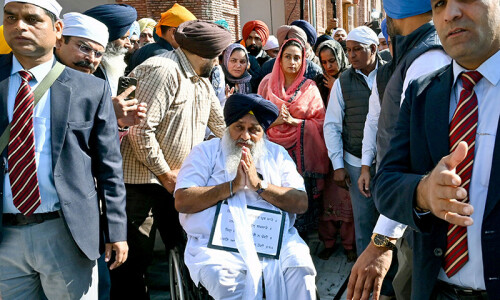KARACHI, Aug 14: Heated debate in various forums over whether administrative control of Sindh’s educational boards should remain with the provincial governor or be transferred to the provincial education department preceded the Sindh Assembly’s bill passed on Wednesday that allowed the executive branch of the government to have control over educational boards.
The bill now needs gubernatorial assent before being passed into law.
Sindh education minister Pir Mazhar-ul-Haq, who will effectively control the province’s educational boards, has been reasoning that they should be put under the administrative control of the education department since that is the case in the three other provinces of the country.
However, a number of college professors and senior officials of the education department opposed the move on the grounds that since all schools and colleges come under the direct control of the education department, examining bodies should be separate entities in order to ensure transparency and objectivity in the grading of examinations.
Currently, in accordance with the relevant Act, the provincial governor is the controlling authority of the six educational boards in the province: the Board of Intermediate Education, Karachi; the Board of Secondary Education, Karachi; the Board of Intermediate and Secondary Education, Hyderabad; the Board of Intermediate and Secondary Education, Sukkur; the Board of Intermediate and Secondary Education, Larkana; and the Board of Intermediate and Secondary Education, Mirpurkhas.
As laid out in the University Act, the governor is also the chancellor of all the province’s public sector universities.
The province’s educational boards are administered by the following legal instruments: the West Pakistan (Board of Intermediate and Secondary Education Karachi) Ordinance 1962, the Sindh Boards of Intermediate and Secondary Education Ordinance VI 1972, the Sindh Board of Intermediate and Secondary Education (Amendment Act 1973), an Amendment Act in 1974 and the Sindh Boards of Intermediate and Secondary Education Amendment Ordinance that was promulgated in 1978.
A number of college professors and senior officers of the education department agree that all these legal instruments have in common the fact that the controlling authority of the educational boards has always been the provincial governor. They believe that in the interests of transparency and objectivity, examining bodies should not be put under the purview of the provincial department of education since it already controls all the schools and colleges of the province.
Transparency, objectivity at stake
Talking to Dawn, they said that across the world, the evaluation and assessment-related responsibilities of education are treated as separate, independent entities in terms of the control and implantation of policies. They pointed out that in Sindh, the education department has control over not only all educational institutions but also related subordinate offices and organisations such as the Bureau of Curriculum and the Sindh Textbook Board. Therefore, they maintained, the examining sector should work separately to ensure objectivity in the grading of results and in signifying the competency level of educational institutions.
“In countries such as the UK and America, it is accepted that examining bodies must work separately and it is for this reason that the Cambridge, GCE and US education systems operate under independent organisations that exclusively manage the conducting of examinations and grading,” they said. “Furthermore, in terms of examining bodies it is vital that the possibility of external interference is reduced as far as possible. The educational boards have been able to deal with such issues objectively since they were under the control of the governor and could therefore resist political pressure.” They pointed out that since the establishment of the various provincial boards of education, no change has ever been made in the relevant legal instruments in terms of the controlling authority. And while in 1988 the Sindh governor delegated through a notification his powers vis à vis the administration of the educational boards to the then provincial education minister, subsequent provincial governor Mahmood Haroon rescinded the notification and restored control to his office.
The critics of the proposal referred to the Sindh Textbook Board, which comes under the umbrella of the department of education, and has for many years been failing to provide textbooks on time. “The education boards also ensure that criteria are maintained in terms of the affiliation of educational institutions when they are registered by the education department,” they said. “In a number of cases, affiliating committees have identified lacunas proving that they were not registered on judicious grounds. The education boards therefore perform the role of a counter-check, which is possible since they do not work directly under the department of education.”
‘Boards’ independence vital’
An educationist referred to a commission, headed by the former chief secretary of Sindh and the Punjab Masood Nabi Noor, on the evaluation and examination system. The commission’s report focussed on the Punjab, where the education boards come under the direct control of the education department. Inter alia, the report stated that “In order to rehabilitate the credibility of the examinations and enable the BISEs to conduct all stages of the examinations in a completely free and fair atmosphere, it is considered essential to restore their autonomous and independent status reposing confidence and administrative powers in the Boards’ chairmen and senior officers and making them accountable to a high-powered authority whose chairman (Mohtasib-e-Imtehanat) shall perform his functions and exercise his powers fairly, honestly, diligently and independently of all extraneous influences, and all executive authorities in the province shall act in his aid.”
Another educationist recalled an admission made by former NWFP chief minister Akram Khan Durrani, who during his tenure as chief minister transferred from the provincial governor to the provincial chief executive the powers of appointing the chairmen of boards of intermediate and secondary education. Now the leader of the opposition in the NWFP assembly, Mr Durrani recently conceded on the assembly floor that his action had been a mistake, and criticised the appointment of some favourites of an Awami National Party leader to the posts of chairman and secretary of the BISE Bannu.













































Dear visitor, the comments section is undergoing an overhaul and will return soon.